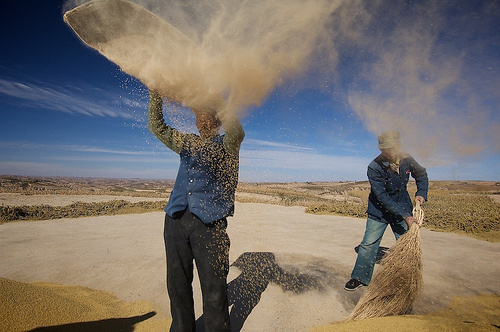“On that day Gad went to David and said to him, “Go up and build an altar to the Lord on the threshing floor of Araunah the Jebusite.” So David went up, as the Lord had commanded through Gad. When Araunah looked and saw the king and his officials coming toward him, he went out and bowed down before the king with his face to the ground. Araunah said, “Why has my lord the king come to his servant?”
“To buy your threshing floor,” David answered, “so I can build an altar to the Lord, that the plague on the people may be stopped.”
Araunah said to David, “Let my lord the king take whatever he wishes and offer it up. Here are oxen for the burnt offering, and here are threshing sledges and ox yokes for the wood. Your Majesty, Araunah gives all this to the king.” Araunah also said to him, “May the Lord your God accept you.”
But the king replied to Araunah, “No, I insist on paying you for it. I will not sacrifice to the Lord my God burnt offerings that cost me nothing.”
So David bought the threshing floor and the oxen and paid fifty shekels of silver for them. David built an altar to the Lord there and sacrificed burnt offerings and fellowship offerings. Then the Lord answered his prayer in behalf of the land, and the plague on Israel was stopped.” (2 Sam 24:18-25.)
After rebelling against God by walking in his own ways and taking a census of Israel, God’s anger burned against the Israelites. In order to restore his relationship with God, David was instructed to build an altar upon a threshing floor. In the Bible, what seems like the most inconsequential of actions or decisions often holds the greatest spiritual truths behind it, and the message of the threshing floor is a powerful one to understand for God’s plan for His people.
A threshing floor is place where the grain was separated from the chaff, where the good and the bad in a harvest were divided. As the chaff was removed, only the goodness of the grain was left. It was a vital part of processing the harvest, as the grain was useless while mixed in with the chaff. True worship always leads to a refining in our lives, separating that which is of God and that which is not. As we live our day to day lives, what is God in us coexists with that which is not God. The negative within us never gets disturbed or challenged. This changes with worship. In a real place of worship, that which is not of God cannot stand as He cleanses us and refines us.
“He will sit as a refiner and purifier of silver; he will purify the Levites and refine them like gold and silver. Then the LORD will have men who will bring offerings in righteousness.” (Mal 3:3.)
An altar is a place of sacrifice, and as we have seen, true worship is worship that is a sacrifice. It was upon this threshing floor that God commanded David to build the altar. This may seem like a strange choice of place for an altar to be built, but this was also the very spot where Solomon established the temple. The temple was not established upon a majestic or clean place, but upon a place of separation and refinement.
As God commanded David to build an altar upon the threshing floor, David understood that he had to pay a cost for it. It was not right simply to be given the threshing floor without paying the price,
David knew that he must sacrifice for it himself. Earlier, People do not value that which is given to them for free. I believe that David understood this, and he demonstrates his heart by wanting to pay a price in order that he could sacrifice before God. David was a man who, despite his faults, was willing to pay the cost to obey God.
“Six days before the Passover, Jesus came to Bethany, where Lazarus lived, whom Jesus had raised from the dead. Here a dinner was given in Jesus’ honour. Martha served, while Lazarus was among those reclining at the table with him. Then Mary took about a pint of pure nard, an expensive perfume; she poured it on Jesus’ feet and wiped his feet with her hair. And the house was filled with the fragrance of the perfume.” (John 12:1-3.)
One of my favourite passages of the Bible demonstrates what it is to worship beautifully. In John 12, Mary takes an expensive flask of perfume, (worth around two years wages,) and pours it on Jesus’ feet. She takes something of such great financial value and has no other purpose than to minister directly to Jesus. Later in this passage Judas complains about her act, demanding that this perfume is used to help the poor instead. However, Mary’s heart desired to minister to Jesus above everything else, regardless of the cost. Mary of Bethany is a perfect example of someone with a heart for worship, a person who has no regard for the cost but only desire to sit at Jesus’ feet and minister to Him.

